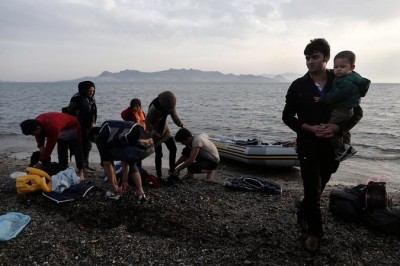Date: Fri, 21 Aug 2015 22:02:07 +0200

Refugees fleeing war zones, persecution, or poverty and unemployment are the world’s least welcome people. America bears full responsibility for millions leaving Afghanistan, Iraq, Syria, Libya, Yemen, Donbass and elsewhere – seeking safe havens in Europe or countries bordering their own.
Hungary deployed thousands of police to its border with Serbia. It’s “under attack (by) increasingly aggressive migrants,” according to Prime Minister Viktor Orban’s chief of staff. Around 130,000 arrived this year so far – triple 2014’s number.
Over 160,000 arrived in Greece – about 50,000 in the last month alone. Welcome mats don’t greet them. Conditions are deplorable.
Families sleep outside because of overcrowding.
Sanitation is lacking. Little medical care or nutritious food is available. Babies are given sugar water instead of milk.
A UNHCR report said 60 million people were forcibly displaced by end of 2014. Globally one in every 122 people are asylum seekers, refugees or internally displaced persons. More than half the world’s refugees are children.
Last month, Doctors Without Borders/Medecins Sans Frontieres (MSF) said Greece’s Dodecanese Islands reception center is on the verge of collapse.
Thousands of migrants sleep outside or in abandoned buildings for lack of accommodations. They haven’t enough food, clean water, medical care, and basic sanitation.
In Kos, hundreds sleep on floors “amidst rubble and shattered glass in an overcrowded, dilapidated building.” MSF teams do their best “treating conditions linked to unhygienic living conditions, including scabies and skin infections.”
Desperately needed humanitarian aid isn’t available in amounts needed. MSF’s Stathis Kyroussis called the situation “a violation of Greece’s and the EU’s obligations toward asylum seekers and migrants…”
Given Athens’ struggling economy, it can’t cope on its own. Help from EU member states is needed. MSF’s Lesvos emergency coordinator said “(l)eaving people to fend for themselves in a field full of garbage or in an abandoned building where there is hardly any water or latrines is simply unacceptable and is putting people’s health at risk.”
Growing thousands needing shelter, toilets, organized food distribution, access to medical treatment and other essentials aren’t getting it.
Despite urgent calls for help, there’s been little or no improvement. Migrants are increasingly on their own to survive. Thousands perish at sea from drowning, starvation, thirst or weather conditions en route to safe havens. Arrivals don’t find it.
A July Amnesty International report said: “migrants heading for Europe fac(e) abuse and extortion in the Balkans…at the hands of the authorities and criminal gangs…”
They’re abandoned by EU policymakers – left “trapped without protection Serbia and Macedonia…” Deplorable conditions await them wherever they arrive. According to AI’s Europe and Central Asia deputy director Gauri van Gulik:
“Refugees fleeing war and persecution make this journey across the Balkans in the hope of finding safety in Europe only to find themselves victims of abuse and exploitation and at the mercy of failing asylum systems.”
“Serbia and Macedonia have become a sink for the overflow of refugees and migrants that nobody in the EU seems willing to receive.”
Both countries “have to do much more to respect migrants and refugees’ rights. But it is impossible to separate the human rights violations there, from the broader pressures of the flow of migrants and refugees into and through the EU, and a failed EU migration system.”
“As increasing numbers of vulnerable refugees, asylum-seekers and migrants become trapped in a Balkan no-man’s land, the pressures on Serbia and Macedonia are mounting.”
“These stresses, like those on Italy and Greece, can only be resolved by a much broader rethink of EU migration and asylum policies.”
Migrants come from the Middle East, North Africa, Turkey after arriving by sea, then to Greece followed by land travel to Macedonia, Serbia, Hungary and other EU destinations.
They endure nightmarish conditions along the way and after arriving – including beatings, financial extortion and other abuses.
A previous article discussed Britain’s appalling centers for refugees and asylum seekers. They’re locked up indefinitely like criminals with no concern for their welfare or right of appeal. They endure torture and other forms of abuse.
Conditions are so bad, some migrants attempt suicide. Detainees are left to rot. Some give up in despair.
A separate article discussed Syria’s refugee crisis – the gravest since WW II, nearly half the nation’s population internally or externally displaced, fleeing Obama’s war to hellhole refugee camps, largely on their own with minimal lifeline help.
RT International interviewed Dr. David Isaacs. He faces possible prison for exposing Australia’s horrific mistreatment of migrants on Nauru island 3,300km northeast of Brisbane, he explained.
“I am breaking the law by talking to you about this, and I could even go to prison for doing this,” he said. “Anyone who works there – doctors, teachers, nurses – could go to prison for two years for telling the truth about what is happening.”
Things are so bad, he felt he had no choice. One young girl “tr(ied) to hang herself,” he said. Many children developed PTSD. Migrants endure “mental torture.” Conditions are hellish.
Letters written by children said they live in dirty tents, flooded during rainstorms. Officers “treat (them) like animals.”
Isaacs compared Nauru detention centers to “prisons.” A former employee responsible for security speaking on condition of anonymity said waterboarding and other forms of torture are used.
A May Australian parliamentary inquiry found rampant child abuse. Many detainees complained of sexual assault. No one was held accountable. No changes in deplorable conditions were made.
Refugees and asylum seekers increasingly are unwanted – especially as their numbers grow exponentially from mostly US-devastated war-torn countries and others where they’re abused. The end of their long anguished nightmare is nowhere in sight.
Stephen Lendman lives in Chicago. He can be reached at lendmanstephen@sbcglobal.net. His new book as editor and contributor is entitled “Flashpoint in Ukraine: US Drive for Hegemony Risks WW III.” Read more about his book here.